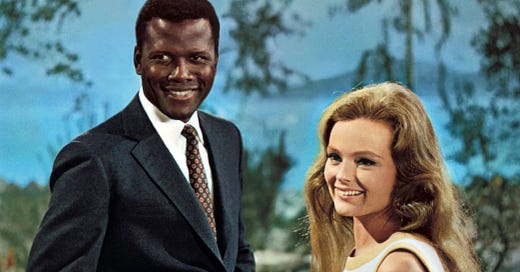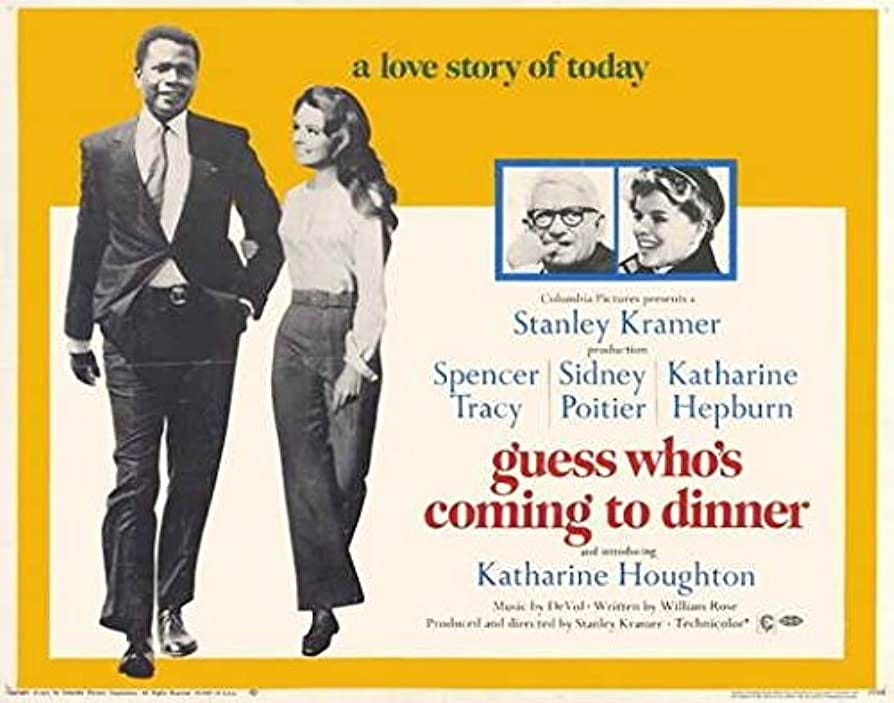AFI Movies: #99 Guess Who's Coming to Dinner
My journey through the "best" movies ever continues, and this time I liked it.
If you missed my first post where I explain what this is and how I’m scoring things, here you go.
P-H-E-W. Thank goodness. I was honestly feeling pretty anxious that we’d have to start this whole thing off with two movies in a row that I didn’t like, but, thankfully, that’s not the case. Guess Who’s Coming to Dinner is a 1967 film starring some absolute legends of Hollywood that I’m worried are just forgotten by younger folks in the 21st century. The movie really focuses on four main characters: Dr. John Prentice, played by Sidney Poitier (the first black actor to win an Academy Award, but for a different film), Joanna Drayton, played by Katherine Houghton, and her parents, Matt, played by Spencer Tracy (who won back to back Best Actor Oscars in 1937 and 1938), and Christina, played by Katherine Hepburn (who was nominated for Best Actress TWELVE times, and she ended up winning four Oscars, she’ll be making several appearances as we go through this list). Honestly, thank God this movie was put in their capable hands, because in the wrong hands it could have been a horrible, offensive train-wreck of a movie.
The plot of the film is simple. Joanna and John met each other while vacationing in Hawaii ten days prior to the day the events of the story take place. In that time, they fell in love, and Joanna has brought John home with her to meet her parents. Normally, I’d take issue with the whole idea of deciding to get married after ten days, because I do think the two show good chemistry, and the quick timeline really adds to the tension of the plot. If you were paying attention reading the last paragraph, you probably see the conflict already. John is a black man, Joanna is a white woman from an upper class background, and it is 1967. In 1967, this type of interracial relationship was not only controversial, but in many states it was still illegal. So, the conflict of the movie is centered around Matt and Christina trying to decide if they approve of the relationship, because John has told them that without the couple’s blessing, he will not go through with the marriage. This is where the acting really comes to be a factor. The audience really has to believe that 1) John and Joanna have chemistry, because if we don’t see their love, then none of this makes sense, 2) Matt and Christina have a good relationship with their daughter, and Joanna truly believes that neither of them will take issue with her marrying a black man, and 3) John knows that he has to win the approval of not just Joanna’s parents, but his own as well. The amount of time this movie spends on really helping you understand what every single character in this story is thinking and feeling, while still being able to get some laughs, is honestly really impressive. In an hour and 47 minutes, this movie develops great characters, says a lot of things about race, and also comments on the key differences between men and women. Just doing one of those things well would have been an accomplishment, but doing all three is what makes it deserving of being called one of the best 100 American films ever.
Anyway, let’s get to the rankings:
Entertainment Value- 2/2
I had an absolute blast watching this one. There are parts of it that are genuinely funny, and it got several laughs out of me. On top of that, I simply cannot rave about the acting enough in this movie. I’ve hit on all the leads, but I want to shout out Cecil Kellaway, who plays Monsignor Ryan, the Drayton’s longtime family friend, and Tillie, the family housekeeper, played by Isabell Sanford. Kellaway’s absolute delight about John and Joanna’s relationship is a necessary element to a film where everyone is very serious about the matter, and Sanford’s performance gave me some of my biggest laughs of the movie.
Correctness Score- 2/2
This might be where my whiteness shows, but I really think they handled this subject masterfully, especially for 1967. While the focus of the film is on this white couple deciding on if they approve of their daughter marrying a black man, the film does a good job of giving us scenes where Tracy and Hepburn’s characters discuss how they raised their daughter to treat everyone equally, and that they should be proud that she took it to heart enough to see a black man romantically. Some of the best scenes of the movie though are when John gets to have separate conversations with each of his parents, who have flown from Los Angeles to San Francisco to join the dinner. John never mentions to them that Joanna is a white woman, so their reaction to the situation is very similar to the reaction of the Drayton couple. Allowing the audience to see the perspectives of each of the black characters, and the dynamic of them as a family was handled masterfully, in my opinion.
Influence- 1/2
This is probably unfair, because the reason I’m docking a point here has absolutely nothing to do with this movie, and everything to do with where movies are at today. Movies like this are just not made anymore, which is honestly a shame. I would love to see a 2023 version of this done with the same care and attention and acting gravitas. Until we get that, though, this stays at a 1 out of 2.
“Rewatchability” Score- 1.5/2
Once again, I watched this movie twice to write this piece, and I greatly enjoyed it both times, and both times there were parts that made me genuinely laugh. However, because it is a bit heavy at times, it’s probably not something I’m going to pop in on a Saturday night when I have friends over, so I’ll take a half point away for that.
Technical Score- 1.5/2
There’s nothing all that impressive here, but the movie still deserves this score because the simplicity of how it is shot, and more importantly, of the music, really lets the acting shine. There are so many points where there is just no music, which just does so much to allow the moments between the characters to sit in the absolute best way. Drowning things out with a score would honestly ruin many of the scenes, so I wanted to recognize the brilliance of leaving music out, because that’s as much of a choice as lazily throwing the score behind some of these scenes.
Overall- 8/10. I definitely think this one is worth checking out at least once.
Hasta luego,
Josh
Up Next: #98- Unforgiven





